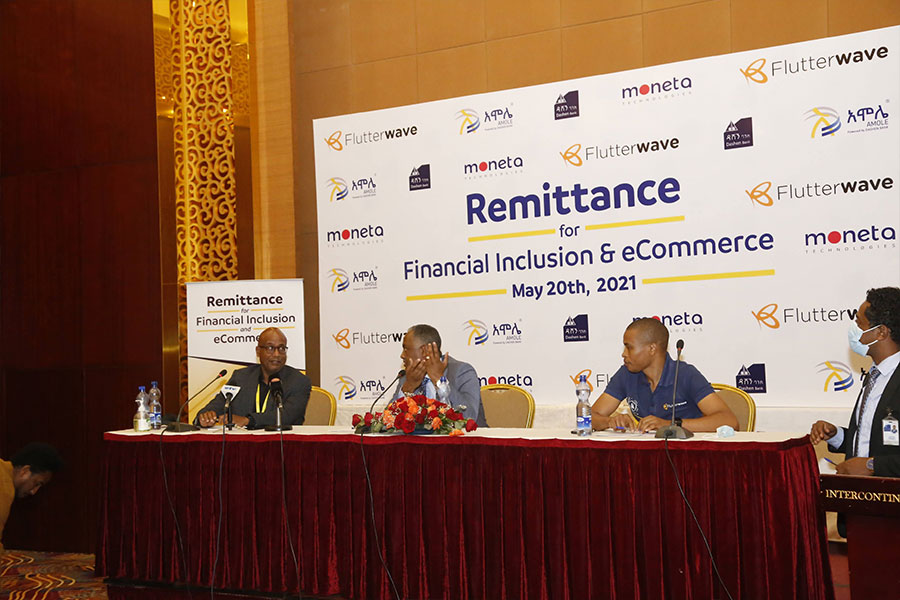
Fortune News | Apr 16,2022
Sep 1 , 2024
By Geremew Milkias
Launching two eCommerce logistics hubs this year should mark a notable leap forward in Ethiopia's quest to become a cross-border and intra-African trade player. It comes as Africa is experiencing a rapid digital transformation, with internet penetration on the continent rising from a mere one percent of the population a quarter of a century ago to around 36pc in 2021. The surge in connectivity is vital as the global economy increasingly redirects toward a digital and knowledge-based framework.
However, intra-African trade remains minimal despite this progress, making up 13.7pc of Africa's total trade in 2022, down from 14.5pc the previous year.
The potential for eCommerce to revolutionise trade in Africa is enormous. Numerous eCommerce platforms are emerging across the continent, and these platforms hold vast untapped potential to facilitate cross-border trade. Many operate on social media applications based outside the continent, predominantly in the U.S., Europe, and China. This external control raises concerns about data sovereignty and consumer protection, which are becoming increasingly urgent as Africa's digital economy grows.
A persistent issue in the emerging digital marketplace is encouraging fair practices while curbing fraudulent transactions. There is a pressing need for just and efficient legal recourse when fraud occurs.
Several African initiatives have been launched to address these problems, including the African Union’s Digital Transformation Strategy (2020-2030), the Continental Artificial Intelligence Strategy, and the African Digital Compact. The Convention on Cyber Security & Personal Data Protection is another crucial step toward harmonising data protection efforts across the continent. To enhance operational efficiency and consumer protection, there is a pressing need for a continental data protection regulation that aligns with the diverse national laws currently in place.
The global digital platforms, headquartered mainly in advanced economies, possess vast reservoirs of data collected over the past decade and a half. This data gives them an advantage in meeting the demands for various products and services. The rapid digitisation in Africa presents a unique opportunity to establish robust standards for data protection and consumer rights, ensuring that the continent's digital transformation is secure and equitable.
While Africa is still catching up to many of the latest developments in digital technology, there is much to be learned from the experiences of advanced economies. For example, the European Union's General Data Protection Regulation (GDPR) offers a comprehensive framework that could serve as a model for African countries as they develop their respective policies and strategies. Tailoring such regulations to fit African countries' unique economic and social contexts will be crucial.
African economies face constraints as they strive to build the necessary digital infrastructure for their rapidly growing populations, which are increasingly connected and demanding faster, more reliable internet services. Alongside this, there is a pressing need to ensure data sovereignty and protect personal information, making the internet safer for all users. However, implementing data protection and consumer protection laws is inhibited by several obstacles, including the lack of independent regulatory authorities and limited resources to enforce compliance.
No less than 36 African countries have enacted data protection laws, with three others having draft laws in progress. Notably, Nigeria’s Federal Competition & Consumer Protection Commission recently fined Meta 220 million dollars for violations of local data protection and consumer laws related to its Facebook and WhatsApp platforms. Nigeria's action showed the growing importance of data protection in Africa and the need for robust enforcement mechanisms.
Ethiopia has made a relatively quiet improvement by drafting a personal data protection bill to guarantee data sovereignty. However, the current draft has limitations as it does not adequately address the influence of global digital giants outside Africa, which are influential actors in the digital economy. The independence of the regulatory authority responsible for enforcing this law is in question, as it falls under the Prime Minister’s Office, potentially compromising its impartiality when the administration is the culprit.
While an important step forward, the bill could be further refined to address the influence of global tech giants that dominate the digital space. By updating the bill to incorporate provisions for dealing with these major players, Ethiopia can help set a new standard for data protection and consumer rights across the continent, ensuring that Africa’s digital future remains safe and secure.
PUBLISHED ON
Sep 01,2024 [ VOL
25 , NO
1270]


Fortune News | Apr 16,2022

Commentaries | Sep 14,2024

Radar | Nov 16,2019

Radar | Dec 12,2020

Fortune News | Apr 22,2023

Fortune News | Apr 26,2025

Agenda | Jun 05,2021

Radar | Nov 11,2023

Fortune News | Aug 20,2022

Radar | Aug 20,2022

My Opinion | 131584 Views | Aug 14,2021

My Opinion | 127940 Views | Aug 21,2021

My Opinion | 125915 Views | Sep 10,2021

My Opinion | 123539 Views | Aug 07,2021

Dec 22 , 2024 . By TIZITA SHEWAFERAW
Charged with transforming colossal state-owned enterprises into modern and competitiv...

Aug 18 , 2024 . By AKSAH ITALO
Although predictable Yonas Zerihun's job in the ride-hailing service is not immune to...

Jul 28 , 2024 . By TIZITA SHEWAFERAW
Unhabitual, perhaps too many, Samuel Gebreyohannes, 38, used to occasionally enjoy a couple of beers at breakfast. However, he recently swit...

Jul 13 , 2024 . By AKSAH ITALO
Investors who rely on tractors, trucks, and field vehicles for commuting, transporting commodities, and f...

Jun 28 , 2025
Meseret Damtie, the assertive auditor general, has never been shy about naming names...

Jun 21 , 2025
A well-worn adage says, “Budget is not destiny, but it is direction.” Examining t...

Jun 14 , 2025
Yet again, the Horn of Africa is bracing for trouble. A region already frayed by wars...

Jun 7 , 2025
Few promises shine brighter in Addis Abeba than the pledge of a roof for every family...

Jun 29 , 2025
Addis Abeba's first rains have coincided with a sweeping rise in private school tuition, prompting the city's education...

Jun 29 , 2025 . By BEZAWIT HULUAGER
Central Bank Governor Mamo Mihretu claimed a bold reconfiguration of monetary policy...

Jun 29 , 2025 . By BEZAWIT HULUAGER
The federal government is betting on a sweeping overhaul of the driver licensing regi...

Jun 29 , 2025 . By NAHOM AYELE
Gadaa Bank has listed 1.2 million shares on the Ethiopian Securities Exchange (ESX),...